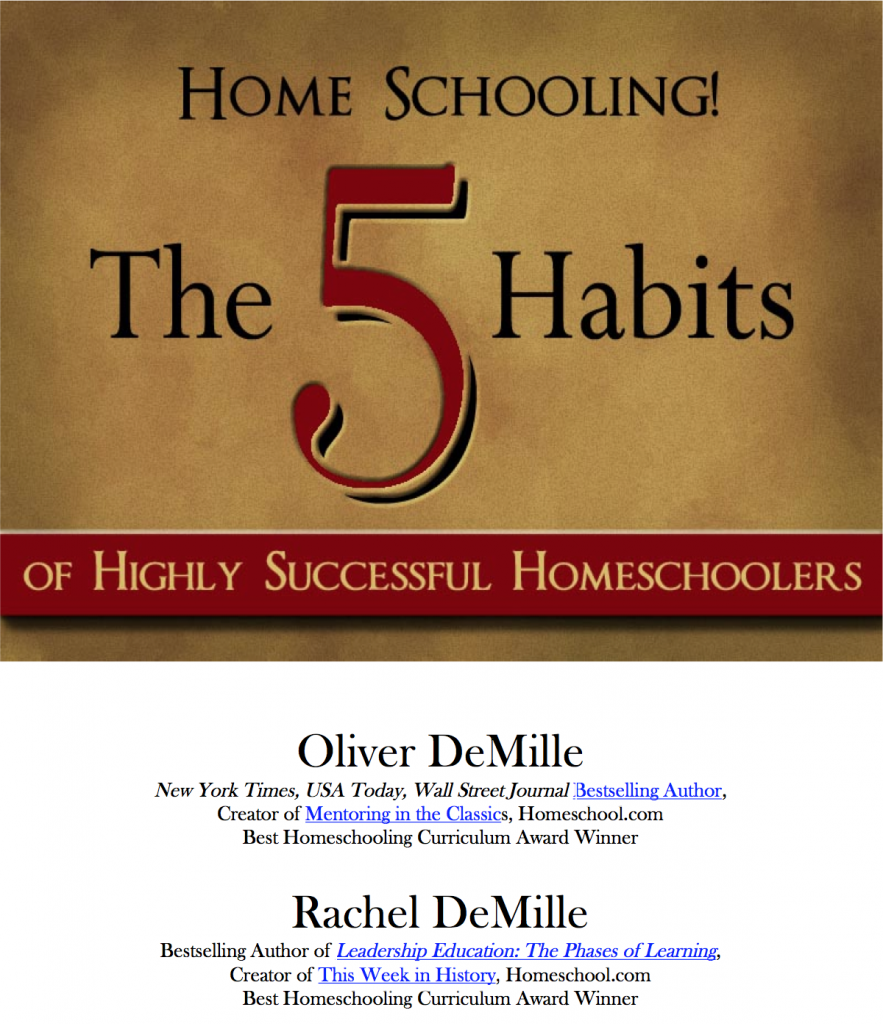 Ever wondered why some families seem to do so well with homeschool? Why some kids just seem to take to stuff naturally, while yours are freaking you out?? Here are some questions to consider, to help set the environment and remove any needless obstacles:
Ever wondered why some families seem to do so well with homeschool? Why some kids just seem to take to stuff naturally, while yours are freaking you out?? Here are some questions to consider, to help set the environment and remove any needless obstacles:
1) EYES & EARS ON
Have you ruled out vision impairment or muscle imbalance that affects focus? Schedule an eye exam. Is hearing an issue? Find out. It’s worth it!
2) REDUCE TOXIC LOAD
Have you ruled out nutritional issues, like sensitivities that create problems with mood, behavior, attention, emotional equilibrium, sleep, etc.? Common triggers are sugars, additives, grains, dairy, processed foods, etc.
Obviously, all of us do better when we make healthy choices; but some kids (and adults) literally cannot function normally with these things, and more “extreme” care must be taken to remove allergens and triggers from their diet and environment.
If this is an issue in your home, it’s life-changing to make the special effort for these accommodations!
3) REDUCE DISTRACTIONS
Have you removed distracting/addictive elements from your home and schedule? Common issues include too much: TV, video games, friend time, scheduled classes/clubs/lessons/sports, etc. For some kids, some families, some years – ANY amount of these can be too much.
Consider a 6-Month “No” to clear your time and take back your family learning life! (For help in owning your life and time, see Phases of Learning, Ingredient #7 and “Start the New Year Right“)
4) REDUCE CLUTTER
Is your home environment somehow disruptive to the learning and family relationships you idealize? Common issues include: too many toys, too much clutter, too many dishes/clothes/belongings that take too much time to care for or don’t have a good place where they are stored.
Consider a 6-Month Purge to take back your space, time and peace of mind! (For help on how to carry out a Purge, see Phases of Learning Ingredient #6 and “Start the New Year Right“)
5) LEAD OUT
Are you trying to copy “school at home?” It’s really easy to rely on the habits and experiences that are familiar to us, especially when we’re under stress or trying out new things. And yet, family learning is ideally a place for a different form to flourish. Invest in your own learning to lead out, by reading a classic book alone and/or with the family.
Do your homework by daily seeking inspiration in TJEd books and audios to help you stay focused and gain new insight on how it can look, feel and be in your home. (For pointers on how to take the lead in your Leadership Education home, see “Kindling, Carrot Sticks and Kidschool” and “TJEd and Riding a Bike“)
6) LET YOUR PLAN FIT YOU
Are you comparing your worst day with your concept of someone else’s best day? Are you trying to implement a vision that’s not compatible with your reality (new baby; caring for an elder; lots of little kids no big kids; health issues)?
Take stock of what matters most to you (Really matters. Not the things that nag you, or make you feel crumby, but the things that you actually are willing to go into the fire for!), and fashion a new ideal that you can actually succeed in. (For a nourishing and nurturing look at how to homeschool in a crisis, see “Chaos and Measuring Sticks; or, Gorillas and Cats. Whatever.”)
7) START FRESH
Have you and your family successfully reconnected and detoxed? As with Step 6, whether it’s a renovation in your school format, a new move, a new baby, an illness, a loss or a big change in any area of your life, reconnecting the family in Core Phase helps to synchronize your energy, re-define your ideals and help each individual thrive in their areas of needed focus.
This is sort of a healing time that brings back a more natural harmony in the home, and restores the child’s (and parents’!) natural love for life and learning. (For details and examples on how to detox and reset, see “6-Point Plan: Advice for Newbies”)
 8) NEW HABITS
8) NEW HABITS
If you found these helpful, rest assured – these are just the beginning! Effective and happy homeschooling is absolutely within your reach. With all of the other stuff out of the way, you’re ready to cultivate new habits – 5 Habits, to be exact! These “secret” habits aren’t really secret – and as you cultivate them, your family and homeschool will thrive, your stress will diminish, and you’ll feel clarity and joy in your family education journey.
Download our e-book, The 5 Habits of Highly Successful Homeschoolers, today!
If you liked this post, sign up for our free newsletter and get additional bonus gifts delivered to your inbox!






























thank you. I have felt like a failure in homeschooling and being a good mom. I am ready to give up homeschooling. We read a lot as a family and individually. But my youngest 3 are not interested in learning to read or do math.
What do you do if you suck at inspiring so your kids are getting behind? What do you do with learning problems like dysgraphia that limit your kids ablity and make them feel incapable? My oldest son wants to learn so many things but it takes him so much time to write anything down and when he does you can’t read it so he even tho he loves a subject he will avoid it because writing makes him feel like a failure.
Renee, you’re not alone! I wish I had more information to better help you; knowing your kids’ ages and history would give me more insight and direction to respond. That said, I have a couple of talks in our TJEd Online Convention that quite specifically address your question regarding your son. It’s available on demand in the shop at “2021 5th Annual TJEd Online Convention Subscription Access“. Look for “Homeschooling the Exceptional Child”. Please feel free to reach out to me using the contact form and I’ll respond with more specific ideas for you and your family. {{{HUGS}}}!!!